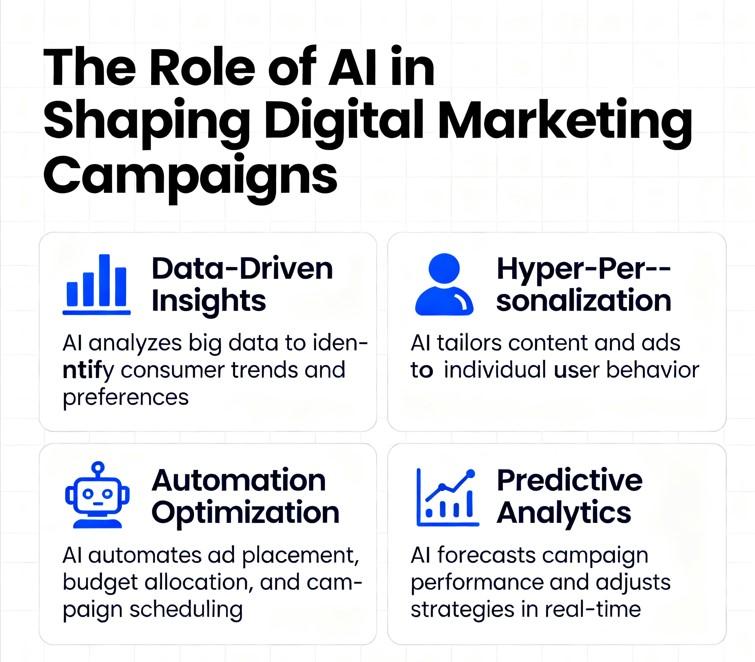The Role of AI in Shaping Digital Marketing Campaigns

Artificial Intelligence (AI) is no longer a futuristic concept—it’s the backbone of modern business transformation. By 2025, AI has evolved from being a “nice-to-have” technology to a must-have engine powering personalized experiences, data-driven strategies, and predictive insights.
For digital marketing, AI is revolutionizing campaign planning, execution, and optimization. From chatbots that provide real-time support to predictive algorithms that forecast customer behavior, AI is fundamentally reshaping how brands attract, engage, and retain their audiences.
In this blog, we’ll explore:
- What AI in digital marketing means today
- The challenges marketers face without AI
- Proven strategies to leverage AI for campaigns
- Trends shaping the future of AI in digital marketing
- Expert tips for getting started
What is AI in Digital Marketing and Why It Matters
AI in digital marketing refers to using machine learning, natural language processing, and predictive analytics to automate, personalize, and enhance marketing activities.
Instead of relying on guesswork, AI helps brands analyze vast data sets, uncover hidden patterns, and make better decisions in real time.
📊 Stat to note: According to PwC, AI is projected to contribute $15.7 trillion to the global economy by 2030, with marketing and advertising being top beneficiaries.
In 2025, companies that integrate AI into digital marketing are seeing:
- Higher ROI through automated optimization
- Enhanced personalization at scale
- Improved customer satisfaction with AI-driven experiences
Simply put, AI has moved from an experimental tool to an essential driver of competitive advantage.
Challenges in Digital Marketing Without AI
Digital marketing leaders who fail to embrace AI face critical pain points:
- Data Overload
- Marketers deal with massive volumes of customer data. Without AI, making sense of it is nearly impossible.
- Limited Personalization
- Generic messaging no longer works. Customers expect tailored experiences—AI enables hyper-personalization at scale.
- Inefficient Ad Spend
- Without predictive insights, marketers waste budget on poorly performing ads and irrelevant audiences.
- Slow Decision-Making
- Traditional campaign management takes days or weeks to analyze results. AI automates real-time insights.
👉 Example: An eCommerce brand using rule-based campaigns may take weeks to adjust ad targeting, while an AI-powered system optimizes campaigns on the fly, reducing wasted spend.
Proven Strategies to Leverage AI in Digital Marketing Campaigns
1. AI-Powered Audience Targeting
Use predictive analytics to identify high-value prospects. Platforms like Google Ads AI and Meta Advantage+ optimize targeting based on real-time engagement signals.
Pro tip: Combine AI with CRM data for even deeper segmentation.
2. Personalized Content Recommendations
AI engines like Netflix’s recommendation system inspire digital marketers to tailor product suggestions, blogs, or video content for each user.
- Tool to try: Dynamic Yield, Adobe Sensei
- Best practice: Continuously A/B test AI-driven recommendations to refine performance.
3. Chatbots & Conversational AI
AI-driven chatbots such as Drift or Intercom streamline customer interactions, answer FAQs, and guide buyers through the funnel 24/7.
- Boosts lead capture by 30–40%
- Reduces response time dramatically
4. Predictive Analytics for Campaign Optimization
AI can forecast which campaigns will perform best before launch. This prevents budget waste and maximizes ROI.
Example: Predictive lead scoring in HubSpot and Salesforce helps sales teams prioritize leads most likely to convert.
5. AI in Content Creation & SEO
From blog writing assistants (like Jasper) to AI-driven SEO platforms (like Clearscope, SurferSEO), AI enhances both creativity and discoverability.
- Identify trending keywords
- Generate SEO-optimized outlines
- Personalize email subject lines for higher open rates
6. Programmatic Advertising
AI automates real-time ad bidding and placement. This ensures ads are shown to the right audience, at the right time, for the right price.
- Tools: The Trade Desk, Google DV360
- Impact: Reduces cost-per-acquisition (CPA) while increasing impressions
Trends and the Future of AI in Digital Marketing (2025 & Beyond)
- AI + Generative Content
- Marketers are using AI to create hyper-personalized images, videos, and interactive content at scale.
- Voice and Conversational Search
- With the rise of Alexa, Siri, and Google Assistant, AI-powered voice search optimization is critical.
- Emotion AI (Affective Computing)
- AI is starting to detect consumer emotions through facial recognition and sentiment analysis, helping marketers deliver campaigns that resonate emotionally.
- Privacy-First AI
- Post-cookie marketing demands AI solutions that balance personalization with strict privacy compliance.
📈 Market forecast: By 2030, 80% of digital marketing activities will be automated by AI.
Pro Tips & Bonus Insights
- Start Small, Scale Fast: Begin with AI chatbots or predictive lead scoring before adopting advanced AI.
- Human + AI = Winning Combo: Don’t replace marketers—empower them. AI handles repetitive tasks while humans focus on strategy.
- Measure ROI Consistently: Use dashboards to track AI-driven improvements in CTR, CPA, and conversions.
Conclusion
AI has become the engine powering digital marketing campaigns in 2025. From predictive targeting to hyper-personalized customer journeys, AI is no longer optional—it’s essential for brands that want to compete and grow.
Marketers who embrace AI now will not only optimize today’s campaigns but also future-proof their strategy in an era of constant change.
👉 Ready to elevate your campaigns with AI-driven marketing strategies? Let’s connect today.
- Art
- Causes
- Crafts
- Dance
- Drinks
- Film
- Fitness
- Food
- Juegos
- Gardening
- Health
- Home
- Literature
- Music
- Networking
- Other
- Party
- Religion
- Shopping
- Sports
- Theater
- Wellness




